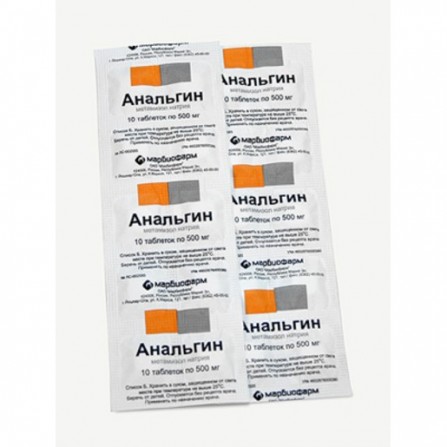Analgin-Marbiopharm pills 500mg N10
Condition: New product
1000 Items

More info
Active ingredients
Release form
Composition
active substance: Metamizole Sodium - 500 mg
Excipients:refined sugar (sucrose), potato starch, calcium stearate 1-water, talc.
Pharmacological effect
It has analgesic, antipyretic and weak anti-inflammatory effect, is a derivative of pyrazolone.
Analgin nonselectively blocks cyclooxygenase and reduces the formation of prostaglandins from arachidonic acid, prevents the conduction of painful extra- and proprioceptive impulses. Analgin has a mild anti-inflammatory effect, causing a small effect on water-salt metabolism (sodium and water retention) and gastrointestinal mucosa. It has an antispasmodic effect on the smooth muscles of the urinary and biliary tract. The action develops after 20-40 minutes after ingestion.
Pharmacokinetics
Well and quickly absorbed from the digestive tract, which ensures the rapid development of clinical effect. When taken in therapeutic doses, penetrates into breast milk.
The maximum plasma concentration is reached in 1-1.5 hours after ingestion. In the intestinal wall, it is hydrolyzed to form an active metabolite, 4-methyl-amino-antipyrine, which in turn is metabolized to 4-formyl-amino-antipyrine and other metabolites. The level of binding of the active metabolite with proteins is 50-60%. Excretion of metabolites passes through the kidneys. In addition, metabolites are excreted in breast milk.
Indications
Feverish syndrome on the background of infectious and inflammatory diseases, headache of various genesis, pain syndrome of mild and moderate severity: neuralgia, myalgia, arthralgia, biliary colic, intestinal colic, renal colic, trauma, sciatica, myositis, postoperative pain syndrome, algodismenorrhea.
Contraindications
Hypersensitivity, hematopoietic suppression (agranulocytosis, neutropenia), hepatic and / or renal failure, hereditary hemolytic anemia associated with glucose-6-phosphate dehydrogenase deficiency and other types of anemia, “aspirin” asthma, leukopenia, pregnancy (especially in I trimester, leucopenia, pregnancy (especially in the I trimester 6 weeks), lactation period, children under 8 years old.
Precautionary measures
The drug should be taken with caution in kidney diseases (pyelonephritis, glomerulonephritis - including a history), with moderately expressed disorders of the liver and kidneys, bronchial asthma, a predisposition to the development of arterial hypotension, prolonged alcohol abuse.
Dosage and administration
Inside, after eating, adults are prescribed 250-500 mg 2-3 times a day, the maximum single dose is 1000 mg, the daily dose is 3000 mg. Single doses for children 8-14 years old - 250-300 mg, the frequency of administration 2-3 times a day. The duration of treatment without consulting a doctor is not more than 5 days.
Side effects
On the part of the urinary system: renal dysfunction, oliguria, anuria, proteinuria, interstitial nephritis, urine staining in red.
Allergic reactions: urticaria (including on the conjunctiva and mucous membranes of the nasopharynx), angioedema, in rare cases - malignant exudative erythema (Stevens-Johnson syndrome), toxic epidermal necrolysis (Lyell's syndrome), bronchospastic syndrome, an obstructive syndrome, an obstructive syndrome, an obstructive syndrome, an obstructive syndrome, an acute epidermal necrolysis (Lyell's syndrome), a bronchospastic syndrome, an obstructive syndrome, an obstructive syndrome, an acute epidermal necrolysis
From the side of blood-forming organs: agranulocytosis, leukopenia, thrombocytopenia.
Other: lowering blood pressure.
Overdose
Symptoms: nausea, vomiting, gastralgia, oliguria, hypothermia, lowering blood pressure, tachycardia, shortness of breath, tinnitus, drowsiness, delirium, impaired consciousness, acute agranulocytosis, hemorrhagic syndrome, acute renal and / or hepatic insufficiency, convulsions, paralysis, respiratory trauma. .
Treatment: gastric lavage, saline laxatives, activated carbon, conducting forced diuresis, hemodialysis, with the development of convulsive syndrome - intravenous administration of diazepam and fast-acting barbiturates.
Interaction with other drugs
Co-administration with other non-narcotic analgesics, tricyclic antidepressants, contraceptive hormonal drugs and allopurinol can lead to increased toxicity; sedative and anxiolytic drugs enhance the analgesic effect of metamizole sodium. Metamizole sodium enhances the effects of alcohol; simultaneous use with chlorpromazine or phenothiazine may lead to the development of severe hyperthermia.Radiocontrast drugs, colloidal blood substitutes and penicillin should not be used during treatment with metamizole sodium.
At the same time the appointment of cyclosporine decreases the concentration of the latter in the blood. Metamizole sodium, displacing oral hypoglycemic drugs, indirect anticoagulants, corticosteroids and indomethacin, increases their activity. Phenylbutazone, barbiturates and other inducers of microsomal oxidation of the liver while the simultaneous appointment reduces the effectiveness of metamizole sodium.
special instructions
When treating children under 8 years of age and patients receiving cytotoxic drugs, taking Analgin should be carried out only under medical supervision.
Patients with atopic asthma and pollinosis have an increased risk of developing allergic reactions. While taking Analgin, agranulocytosis may develop, and therefore, when detecting an unmotivated rise in temperature, chills, sore throat, difficulty swallowing, stomatitis, as well as the development of symptoms of vaginitis or proctitis, immediate withdrawal of the drug is necessary. With prolonged use, it is necessary to control the picture of peripheral blood.
Use for removal of acute abdominal pains (before finding out the reason) is unacceptable.
Storage conditions
List B. In a dry, dark place at a temperature not exceeding 25 ° C.


